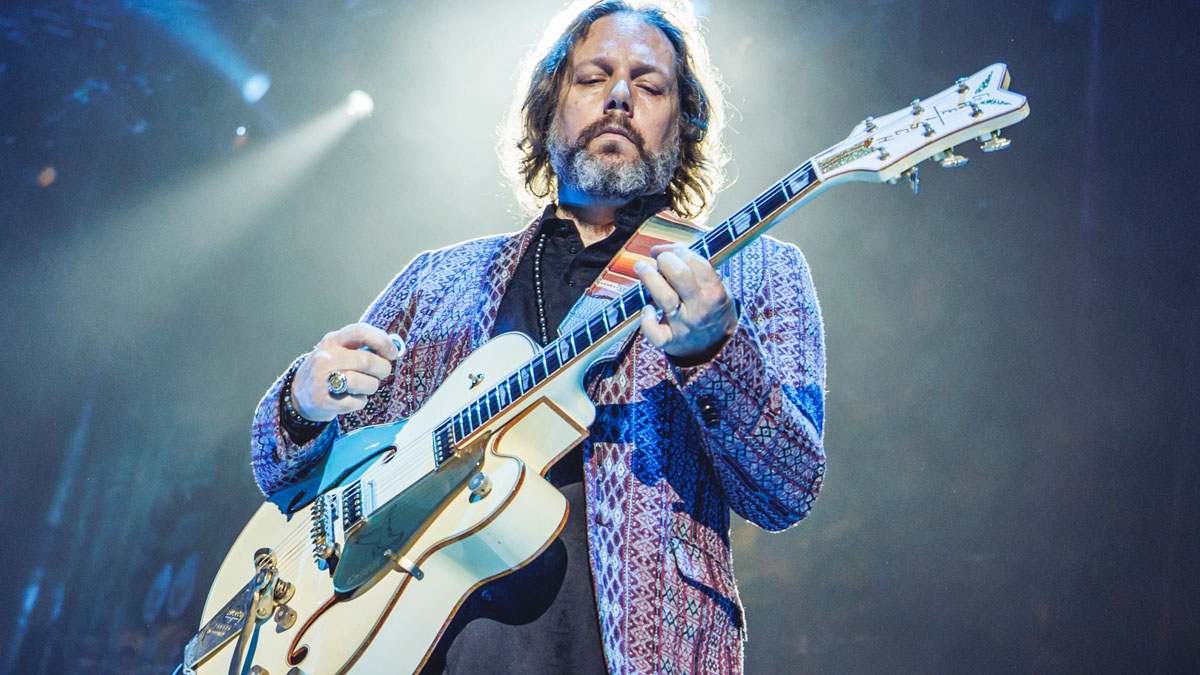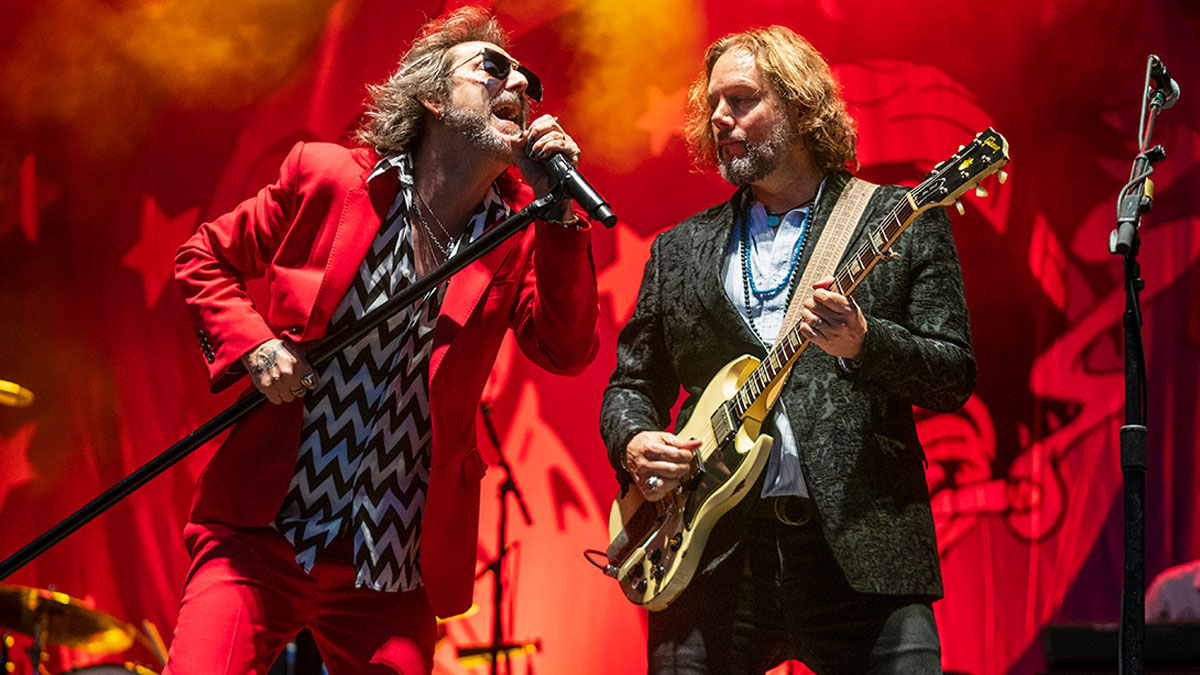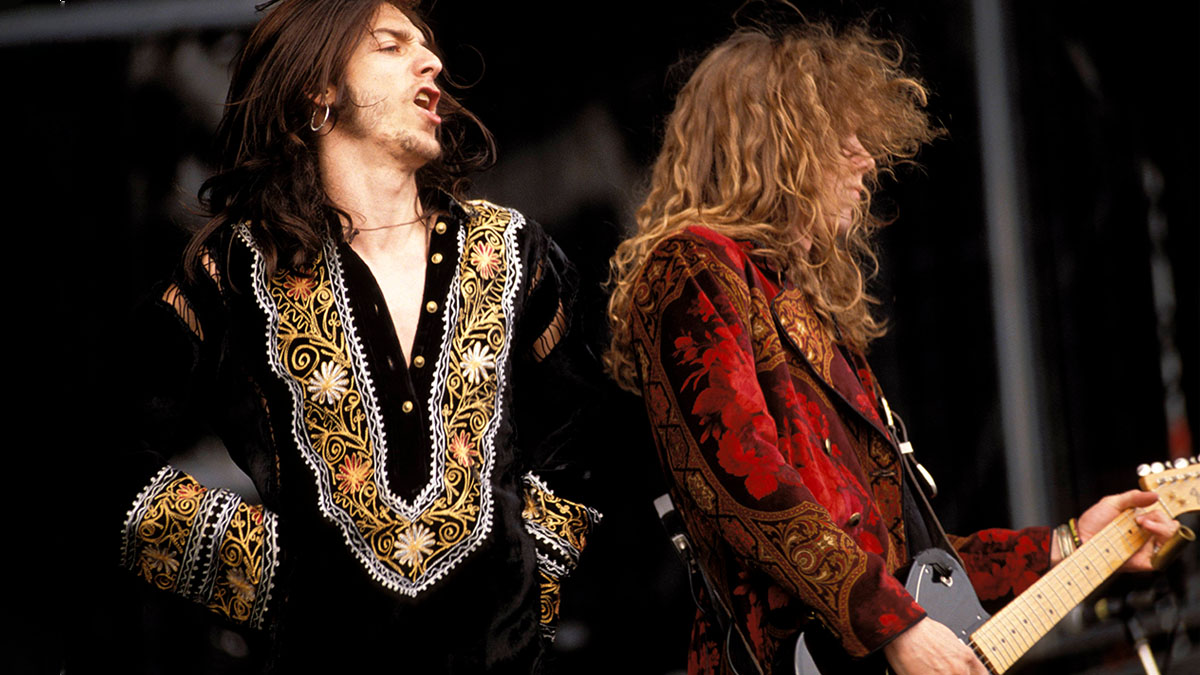“I have my sound; 98% of the tone comes from me. I can plug into most amps and make it sound like me”: Rich Robinson on the guitars, tunes and focus behind the Black Crowes’ comeback
The Black Crowes are back on their perch with an album that delivers a masterclass in rock 'n' roll songwriting. Here guitarist Rich Robinson explains how it all came together...

Want all the hottest music and gear news, reviews, deals, features and more, direct to your inbox? Sign up here.
You are now subscribed
Your newsletter sign-up was successful
The Black Crowes’ comeback is a rock ’n’ roll miracle. For a time, at least from the outside looking in, the very idea of brothers Chris and Rich Robinson in the studio working together sounded ill-advised, like putting two piranhas in the tank together.
But whatever their differences in the past, this, their third reunion by most people’s reckoning, is real, and it has bore fruit, successfully celebrating the 30th anniversary of their debut album, Shake Your Money Maker, with a tour in 2020, and with an all-new studio album, Happiness Bastards, shepherded onto tape by producer Jay Joyce, and out now via Silver Arrow.
The records were recorded lifetimes apart but what they both share is focus, a sense of knowing just what to do. And a band can get a lot done when it knows exactly how things should play out. With Shake Your Money Maker, the focus came from youthful exuberance, from not knowing any different. Rich Robinson was just 17 when he started writing it. With Happiness Bastards, he says the focus came from revisiting their debut, playing it in its entirety, and the discipline that brought to the writing.
“It brought us back to, ‘Okay, that’s cool. There’s a gift here. It’s like a three-minute song and it’s really cool, and it’s focused,’” he says. “Looking at these songs, and songwriting, and how we did this one, there is definitely far more of as focus to it. Trim the fat, get in there and get out.”
By Chris’ estimation, the whole thing was done in two-and-a-half weeks, and it sounds like it. There is an electric energy to tracks like Bedside Manners, all chewy gravel slide and a propulsive beat, and Wanting And Waiting, with its itinerant, free-range riff. The mix is three-dimensional; it makes you feel like you are in the room right there with them.
I have always subconsciously written for Chris’ voice – that’s how I started. So every song I write is always really in the back of my head, ‘Oh, this would be kinda cool for his voice’
“It’s a great record and I’m really happy with it, and you do sound like you are in the room with us,” says Rich. “Because we’re just in there playing, y’know! There’s no trickery. The whole band’s in there playing. There’s a couple of overdubs but you have these songs, you go in, you record them.”
There’s no trickery but there is sleight of hand. The Black Crowes have always been a band who were not afraid to betray their influences and yet sound just like them, to do something only they would. “My two biggest influences are kind of contradictory,” says Rich. “It’s like Nick Drake and Keith Richards! [Laughs] So how do you merge those two? I mean, I dunno! I kind of figured out how to do some of it but I don’t know.”
Want all the hottest music and gear news, reviews, deals, features and more, direct to your inbox? Sign up here.
One way is by combining electric guitar with acoustic, a la Led Zeppelin, the Stones, and using the acoustic as a complementary texture. Besides, Rich wrote all of Happiness Bastards on acoustic guitar just as he always has.
“I still write 100 per cent on acoustic,” he says. “If the song sounds good in its most basic form then it is a good song. That’s what I always believe. Any song I write has to sound good in acoustic form or it’s not worth it.”
But that is just the start of it. Then you’ve got to electrify it, find an amp, turn it up, and go hunting tones. Just don’t get too fancy. As the younger Robinson brother explains here, don’t get too precious about it. You’ve got to go with the flow…

Let’s start at the beginning. Was Wanting And Waiting the first song that came together, and did you know then that it would be the catalyst for this record?
“Yeah, that was one of a couple of songs that I had written kind of before we had got back together, and I was just like, ‘Man, I wish I could hear Chris sing on this.’ So I didn’t really write it for anyone.
“Although, I have always subconsciously written for Chris’ voice – that’s how I started. So every song I write is always really in the back of my head, ‘Oh, this would be kinda cool for his voice. This could be cool for that.’ Ultimately, that’s how it has always been.
“I mean, that song in particular, when I wrote it I was like, ‘Oh, man, this thing is really cool.’ It reminded me of AC/DC or something cool, just with the big driving groove behind it.”
It has that Angus Young-style solo in it, too.
“Yeah, totally! I thought it was great, really good, and I am happy the way it came out in the end.”
You really are an enigma as a band, because it’s not like you hide your influences, but at the same time, something like that AC/DC influence is not necessarily obvious until you pointed it out.
“Well, I believe everyone plays like themselves. Inspiration comes from life, no matter what it is. It could be songs. It could be divorce. It could be marriage. It could be anything, travelling, seeing things, and I have always felt like I am a conduit… All these life experiences create a filter, and I always liken it to a stained glass, and every new adventure or experience creates another portion of this stained glass.
We did two small club tours playing to 50 people a night and then we opened for Aerosmith... By the end of that tour we played with AC/DC and Metallica all over the world and played in Moscow in front of 600,000 people
“Although I do draw from my heroes, and great songs, and great, parts, great guitar playing, it all comes through my filter and sounds like me when it comes out the other side.
“And it is so funny, even growing up. Shake Your Money Maker was a highly derivative recored. We loved it. But I was 17 when I started writing it. I was still in high school. I didn’t have a worldview so much. I didn’t have a ton of experience.”

“I mean, I was living with my parents and going to high school everyday, and I had that experience but I didn’t have the experience of the world, or seeing what we saw. Chris and I made that record when we were kids.
“It came out, and within 18 months of doing the Shake Your Money Maker Tour, 350 shows, I dunno, 40 countries! [Laughs] It was like a fast injection of life experience, and all of a sudden we had this experience, like, ‘Shit!’ We did two small club tours playing to 50 people a night and then we opened for Aerosmith.
“We opened for Aerosmith, Robert Plant and ZZ Top, and by the end of that tour we played with AC/DC and Metallica all over the world, and played in Moscow in front of 600,000 people.”
The Stones would have never had made a song like Remedy, or Sometimes Salvation
And there is no way you are the same people by the end of all that.
“That sort of [life experience] allowed us to come right off that tour, after becoming a professional band, and walk into the studio; we made Southern Harmony [The Southern Harmony and Musical Companion, 1992] and Southern Harmony was the first record that I feel like was our skin as a band. We stepped into who we were.
“And when you listen to that record, the Stones would have never had made a song like Remedy, or Sometimes Salvation. There is all sorts of music and records that we have made that really were ourselves, but because we kind of got lumped into this thing… It was easy to write it off as something else, ‘Oh, they’re that Stones band. They’re this band. They’re that band.’
“But if you really listen to us, follow our journey, going from Shake Your Money Maker to Southern Harmony, to Three Snakes [And One Charm]; that is a huge leap in what sort of music we swam in. We took a journey.”
Was there a plan behind it all?
“We didn’t focus on hits. We weren’t trying to focus on the same thing, so we just made the records that we wanted to make, and by the time we got to By Your Side, it was like, ‘Well, it’s time to make a rock ’n’ roll record.’ And then we took another left turn with Lions, and we pushed it with Lions.
“We have always done things the way we’ve done things. ‘How does this feel to us?’ We’re making a record, ‘How does this feel? How does this sound? This sound inspires me and so I am going to make this into a song.’ And so on, and so on.”
We’ve never been bothered with pressure or these kinds of things – to try something. It’s always natural
“And also, we’re still of the belief that a record is a piece unto itself, so not only do you make a song, and the song is a piece, but the song is a piece of a larger piece, which is this record, so you have 10 songs that take you on a journey, and everything has everything to do with that.
“How you sequence the record. How the record starts. How it stops. How it goes in the middle. Where it comes from. Where it goes… Those sorts of things. And so, ultimately, that’s what we’ve always done, and we’ve never been bothered with pressure or these kinds of things – to try something. It’s always natural.”
There is a real energy to Happiness Bastards. Did doing the Shake Your Money Maker anniversary tour maybe informed this record ?
“The interesting thing about doing that Shake Your Money Maker tour was that it was a focus that we really hadn’t had before. We were focusing on playing this record in its entirety, in the way that it was sequenced and in the way that we made it. And that was really cool for us because we had never done that before.
“We are always pushing for things to push us forward, things that will keep us inspired for years and years and years. For most of our career we would change up the setlist every night. Extend it out, jam, do all these things. But the one really cool thing about the Shake Your Money Maker tour was it really focused us.
It was interesting that Jay suggested the acoustic on Cross Your Fingers, which is a cool choice because its often overlooked how well acoustics work with electric in rock ’n’ roll.
“All of these songs, I demo at my house. I did write it on acoustic and did record it with acoustic and electric, and there is a cool thing about the way those two guitar sonics work well together, like when you can get a good blend of acoustic and electric and work them into the mix it is one of the coolest sounds. I am always up for that.”
Our tendency would be like, ‘I want it my way. He wants it his way.’ And that can cause friction, so we went into the record really open to hearing what Jay had
What do you look for in a producer? Is it as an extra engineer or for a deeper input?
“All of my solo records and Magpie [Salute] records, I produced, and wrote 100 per cent of my stuff, and with Magpie I wrote most of it and produced it, and I have produced other bands, and wrote for other bands, and I did a ton of stuff like that. Chris did too, and he produced a lot of other bands, and was spending a lot of time in the studio.
“We both had our own kind of process and belief systems, and we both agreed early on, ‘We need a producer!’ [Laughs] We needed someone we could turn the reins over to, that would be really cool, and that we would trust, and would come in and point things out to us. And just kind of oversee us, because our tendency would be like, ‘I want it my way. He wants it his way.’ And that can cause friction, so we went into the record really open to hearing what Jay had.”

“We talked to a lot of producers, and when we spoke to Jay we really liked what he said, and we really liked his vibe. And was a great musician on his own, and a great producer, so it felt great to us.
“Going into the studio and making this record with him felt that way. He wasn’t afraid to try different things. He wasn’t afraid to push us in certain ways and in other ways be like, ‘Oh wow! That’s a great idea. Let’s try that.’ It was a really collaborative effort.”
Before everyone agreed upon 440 tuning, everyone just tuned up to where they were and they just went and ran with it. Some of the best records!
Specifically, what guitars are we hearing there?
“Well it is the Martin D-28, the signature D-28 I have. I can’t remember if I doubled it or not, but it’s the Martin and then my ’61 335.”
What do you use for slide?
“I just use my signature slide. It’s a brass slide and it’s real heavy, and it is taped on the inside, so you can control it a little better.”
Do you have a favourite guitar for slide playing or are you happy using any of them?
“I am happy using any of them. I mean, a couple of them, the action is not set up for slide so it is a little more difficult but most of them I can get around on, and it kind of depends on the song.”
That’s interesting, because some players really have a specialist guitar for slide, but then this record sounds like a grab and go recording; it doesn’t sound like you want to be tuning up and setting up between takes.
“No, we’ve never been that uptight! [Laughs] No, look, it’s a guitar, and the thing is it’s all relative. Some of the best records of all time were made on a four-track. Before everyone agreed upon 440 tuning, everyone just tuned up to where they were and they just went and ran with it. Some of the best records!
“And so sometimes technology can be an interesting tool, and it can make things more convenient, and it is what it is, but people have done much more with much less, and so we never really get uptight with that whole thing. We just do our thing, and we’re confident in what we do and that’s it, and therefore it’s kind of just us.”
But your tones are so… nice. That is essential, right, because rock ’n’ roll is an unforgiving medium. You need that authenticity of tone.
“Yeah, totally. Lyrics tell a story. Music is kind of like a delivery system. Music creates the emotional background to what you are trying to deliver, and it gives weight to what you’re singing about. The tone is the tone. I have my sound, 98 per cent of the tone comes from me, of my tone. I can plug into most amps and make it sound like me, a little bit, and Jimmy Page is the same thing.
The tonality, a lot of it comes from the actual person, and if the person is a unique player and brings his or her uniqueness to the table, then that’s going to really just be them
“I remember Jimmy plugged in and, ‘Shit, that’s Jimmy Page!’ [Laughs] I did some shows with Robby Krieger, really sweet guy, he had an SG and a Blues DeVille, and it sounded like Robby Krieger, like, ‘Holy crap! That’s Robby Krieger.’ Same thing with Peter Buck. I just did this REM thing last year, and Peter Buck sounds like Peter Buck.
“The tonality, a lot of it comes from the actual person, and if the person is a unique player and brings his or her uniqueness to the table, then that’s going to really just be them. Not unlike a singer, like Chris, or like Rod Stewart, or Steve Marriott, or whoever it might be.
“You hear those guys sing, you know it’s them. You know Joni Mitchell singing. You know it’s Aretha Franklin. You know who Tina Turner is. Nowadays, everyone sounds all the same because it is so processed and computer-driven.”
There’s definitely something of the connoisseur to your tonal sensibility...
“I still care about tone, and I still care about the amps I use, and I have my own amp company I started for that very purpose. Six out of 10 or 11 tracks where on my Muswell, which is based on this 1968 Bluesbreaker I have, which is amazing. And then there are a couple of songs where I play this old Fender White.
“It was like a cheaper model of a Fender amp – it was like a Princeton – and they ran with this model for a year in the ‘50s, trying to separate Fender from this other company, but it is one of the best-sounding Princetons I have ever heard! This thing is amazing.“
Some of the best-sounding Martins are D-18s, and they are almost a student model. There are not accoutrements to it, but they f**king sound amazing!
What other guitar amps did you use?
“I have three ‘50s Fender Deluxes, just these tweed Deluxes from the ‘50s, and then I have this Silver Jubilee that I have had since 1988, that I toured with on Shake Your Money Maker and Southern Harmony. I’ve had it forever and it just has a thing and it sounds great.
“Jay was like, ‘Just throw a mic up! If the sounds great coming through the amp, throw a mic up! You don’t get fancy. Just do it.’ And it should be that easy. That was the thing I really liked about Jay. He wasn’t too precious. ‘Oh yeah, throw that up there and see what that sounds like. Yeah, let’s do this.’
“There’s a movement with all of it. And there’s a flow within all of it. Sometimes you can get bogged down, and sometimes you have a flow, and the flow is just far more creative and interesting.”
Making records isn’t easy but you don’t want it to be hard work. The good tones don’t need to be from expensive stuff. You mention Robby Krieger, he played an old catalogue Kay and it sounding amazing.
“Exactly! Some of the best-sounding Martins are D-18s, and they are almost a student model. There are not accoutrements to it, but they fucking sound amazing! You get an old ‘50s or ‘60s Martin D-18? Amazing sounding. And a lot of times that can just be what it is.
“I find that sometimes the thing about technology is when you have everything at your fingertips, if you are not disciplined, then you go down a whole. It’s like a black hole of trying things out, overthinking.
“But when you have – like I was saying earlier about the four-track recorder – boundaries that are more defined, and maybe a little harder, you have to be more creative to exist within that tighter space.”
Talking about tone, and how it is an expression of the player, how important is it to find an amplifier that makes you sound like you, that makes you feel like you? Because all tube amps feel a little different under the fingers, different compression.
“Absolutely, but I also think there is a vibration to all of it, and it’s like you and the amp are working separately but together at the same time; what you are feeding the amp and what the amp is feeding back to you. You are working within that. To me, sonically, when you plug an amp in, what I always look for is a vibration that works. Like, ‘Okay, cool.’ It’s like it is almost working with the systems in my body.
When you plug an amp in, what I always look for is a vibration that works. Like, ‘Okay, cool.’ It’s like it is almost working with the systems in my body
“There is something amazing about hearing that and feeling that at the same time, and then how it works coming off your guitar, and it all comes down to taste and inspiration really. I play this thing, it sounds great, it pushes me forward to play differently, it pushes me to play more, and it elicits an inspiration because it sounds a specific way.
“And it is interesting playing with other things, like when you plug into an amp and ‘what the hell was that!?’ It has a whole repulsive [quality]. It really freaks me out, like I could not even play that.”
There are some amplifiers that make you feel like you can’t play guitar at all.
“Yeah, to the point where it is so uninspiring that I don’t want to play.”
A lot of this is psychological, like with in-ear monitors too.
“Yeah, it is psychological, and you feel like you are in a goldfish bowl or something when you have to put those in. We don’t play with in-ears. We play with monitors onstage. I don’t believe in in-ears. They sound horrible and you lose connection with the audience and you loose connection with the band.”
Your touring pedalboard is pretty pared down by today's standards, with most just a few choice drives for a little something extra.
“Yeah, just a couple of overdrives. I have a couple of Echoplexes, which I use one on a slapback and one on a long delay. The tone should come from the amp and the pedals are used a little bit here and there for – like you said – a little boost, a little fuzz or whatever you need.
“But the tone needs to come from the amp, and it’s funny when some guitar players I’ve seen, friends of mine, they turn on their amp and then they turn that pedal on and that’s their tone. And I’m like, ‘Just get a good amp, and turn it up!’ And that’ll sound great.”
- Happiness Bastards is out now via Silver Arrow.
Jonathan Horsley has been writing about guitars and guitar culture since 2005, playing them since 1990, and regularly contributes to MusicRadar, Total Guitar and Guitar World. He uses Jazz III nylon picks, 10s during the week, 9s at the weekend, and shamefully still struggles with rhythm figure one of Van Halen’s Panama.













